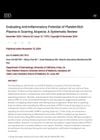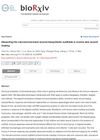 December 2019 in “Pediatria i Medycyna Rodzinna”
December 2019 in “Pediatria i Medycyna Rodzinna” Alopecia areata is a hair loss condition that may be linked to stress and genetics, often requires psychological support, and has no set treatment.
 23 citations,
June 2003 in “Journal of Investigative Dermatology Symposium Proceedings”
23 citations,
June 2003 in “Journal of Investigative Dermatology Symposium Proceedings” Alopecia Areata is an autoimmune disease affecting hair follicles, influenced by genetic and environmental factors, with rodent models being essential for research.
 9 citations,
July 2021 in “Essays in Biochemistry”
9 citations,
July 2021 in “Essays in Biochemistry” Sex hormones may influence COVID-19 severity, with males at higher risk, and certain hormone therapies could potentially treat the virus.
13 citations,
January 2017 in “Annals of dermatology/Annals of Dermatology” Simvastatin/ezetimibe may help some patients with severe alopecia areata regrow hair.

Alopecia Areata is treated with drugs and therapies to reduce inflammation and immune response.
April 2024 in “Molecules/Molecules online/Molecules annual” Paris polyphylla saponins may effectively treat acne due to their antibacterial and anti-inflammatory properties.
 September 2023 in “Journal of Cosmetic Dermatology”
September 2023 in “Journal of Cosmetic Dermatology” Lower vitamin D levels are linked to higher CRP levels in people with a type of hair loss called alopecia areata.
 September 2023 in “International Journal of Trichology”
September 2023 in “International Journal of Trichology” Oral Vitamin D can improve hair density and reduce hair loss in Telogen Effluvium patients.
 August 2023 in “Medical Hypotheses”
August 2023 in “Medical Hypotheses” Metformin, usually used for diabetes, can also help treat hair loss from alopecia areata due to its ability to reduce inflammation and stimulate new hair growth.
 38 citations,
January 2016 in “Cell Death and Disease”
38 citations,
January 2016 in “Cell Death and Disease” The TCL1 transgenic mouse model is useful for understanding human B-cell leukemia and testing new treatments.
73 citations,
December 2010 in “Current opinion in infectious diseases/Current opinion in infectious diseases, with evaluated MEDLINE” Hidradenitis suppurativa is a skin condition possibly caused by hair follicle issues, with treatments focusing on infection and inflammation.
 16 citations,
October 2018 in “Experimental Dermatology”
16 citations,
October 2018 in “Experimental Dermatology” Mesenchymal stem cell therapy may help treat alopecia areata by promoting hair growth and reducing inflammation.
 November 2020 in “Bali Medical Journal”
November 2020 in “Bali Medical Journal” PRP may help hair growth in alopecia areata without major side effects, but more research is needed.
 2 citations,
January 2017 in “AIMS cell and tissue engineering”
2 citations,
January 2017 in “AIMS cell and tissue engineering” Mesenchymal stem cells show promise for treating various skin conditions and may help regenerate hair.
 April 2017 in “Journal of Investigative Dermatology”
April 2017 in “Journal of Investigative Dermatology” Higher leptin levels link to hair loss.
 6 citations,
November 2017 in “Dermatologic Therapy”
6 citations,
November 2017 in “Dermatologic Therapy” Combining mometasone furoate cream with adapalene gel is safer and more effective for hair regrowth in alopecia areata than using the cream alone.
 8 citations,
July 2022 in “BMC neuroscience”
8 citations,
July 2022 in “BMC neuroscience” Transplanted hair follicle stem cells improved brain function and reduced damage after a stroke in rats.
 5 citations,
May 2023 in “Frontiers in immunology”
5 citations,
May 2023 in “Frontiers in immunology” Environmental factors like diet and vitamin levels, especially Vitamin D, can affect autoimmune diseases differently, with lifestyle changes potentially improving outcomes.
 November 2024 in “Journal of Drugs in Dermatology”
November 2024 in “Journal of Drugs in Dermatology” PRP shows promise for scarring alopecia but needs more research before replacing current treatments.
 13 citations,
November 2021 in “Frontiers in Immunology”
13 citations,
November 2021 in “Frontiers in Immunology” Melatonin could be an effective treatment for Alzheimer's Disease and rosacea.
 August 2023 in “International journal of medical science and clinical research studies”
August 2023 in “International journal of medical science and clinical research studies” PRP therapy helps heal pediatric surgical wounds faster and with fewer scars but needs more research for safety and cost.
 4 citations,
January 2022 in “Journal of clinical and translational research”
4 citations,
January 2022 in “Journal of clinical and translational research” Chitosan-based dressings reduce inflammation and speed up skin wound healing.

Use the least toxic, most specific treatments for skin diseases, considering side effects and individual patient needs.
 1 citations,
July 2023 in “Cytotherapy”
1 citations,
July 2023 in “Cytotherapy” Magnetic nanovesicles from stem cells can improve hair growth by staying in the skin longer.
 1 citations,
July 2024 in “Journal of the European Academy of Dermatology and Venereology”
1 citations,
July 2024 in “Journal of the European Academy of Dermatology and Venereology” Oral dutasteride is effective and safe for treating frontal fibrosing alopecia.

New treatments for vitiligo may focus on protecting melanocyte stem cells from stress and targeting specific pathways involved in the condition.

North American ginseng extract helped regrow hair in balding mice.
 April 2017 in “Journal of Investigative Dermatology”
April 2017 in “Journal of Investigative Dermatology” HPH-15, a new compound, effectively reduces skin fibrosis in experiments without causing harm.
 6 citations,
January 2019 in “Medical Hypotheses”
6 citations,
January 2019 in “Medical Hypotheses” Frontal Fibrosing Alopecia might be an autoimmune disease.
 2 citations,
August 2020 in “bioRxiv (Cold Spring Harbor Laboratory)”
2 citations,
August 2020 in “bioRxiv (Cold Spring Harbor Laboratory)” The Aligned membranes improved wound healing and hair growth with a better immune response in mice.



























